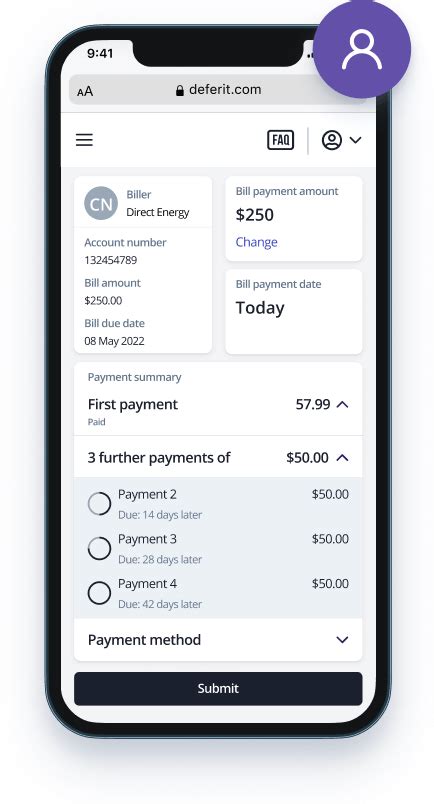Deferit Bill Payment: Your Questions Answered
Paying bills on time can sometimes feel like a juggling act. Unexpected expenses, financial setbacks, or simply overlooking a due date can leave you scrambling to avoid late fees and potential damage to your credit score. Deferring bill payments offers a potential solution, but understanding the process and its implications is crucial. This comprehensive guide answers your most pressing questions about deferring bill payments, helping you navigate this complex financial landscape with confidence.
What is Deferring a Bill Payment?
Deferring a bill payment means requesting your creditor (the company you owe money to) to postpone the due date of your payment. This isn't the same as skipping a payment altogether; it's a formal request to reschedule the payment to a later date, often with agreed-upon terms. The success of a deferral request depends heavily on your relationship with the creditor, your payment history, and the specific circumstances surrounding your request.
How Do I Defer a Bill Payment?
The process for deferring a bill payment varies depending on the creditor. However, most methods involve direct communication. Here's a general approach:
-
Contact your creditor: Reach out to the company as early as possible before the payment due date. Contact methods include calling their customer service line, sending a secure email through their online portal, or writing a formal letter.
-
Explain your situation: Clearly and honestly explain why you need to defer your payment. Be prepared to provide supporting documentation if necessary, such as proof of unexpected medical expenses or job loss.
-
Negotiate new terms: Work with the creditor to agree on a new payment due date and any potential fees or interest that may apply. Get everything in writing to avoid future misunderstandings.
-
Confirm the agreement: Once you've reached an agreement, confirm it in writing and keep a copy for your records.
What Happens if I Don't Pay My Bill After Deferral?
Failure to pay your bill even after deferral will have serious consequences. You'll likely face late fees, penalties, and potential damage to your credit score. The creditor may also pursue collection actions, such as sending your account to a collections agency, which can further harm your credit and lead to legal action. Always honor the agreed-upon terms of your deferral.
Can I Defer All Types of Bills?
While many types of bills can be deferred, it's not guaranteed. Credit card companies, utility providers, and loan servicers often have specific policies regarding payment deferrals. Some types of bills, such as rent or mortgage payments, might require more formal legal processes. Always check the terms and conditions of your individual agreements.
What is the Impact on My Credit Score?
Deferring a bill payment can have a minor negative impact on your credit score, especially if it's not handled properly. Late payments, even those resulting from a deferral agreement that wasn't honored, will significantly damage your score. However, a successfully negotiated and adhered-to deferral is usually less damaging than a missed payment.
Are There Fees Associated with Deferring a Payment?
Some creditors might charge fees for deferring a payment. These fees can vary widely depending on the creditor and the specific circumstances. It's crucial to understand these fees before agreeing to a deferral. Negotiating the removal or reduction of these fees is often possible.
What if My Request for Deferral is Denied?
If your request for a payment deferral is denied, explore other options. Consider contacting a credit counseling agency for assistance in managing your debt. They can help you create a budget, negotiate with creditors, and potentially develop a debt management plan.
Conclusion: Proactive Communication is Key
Deferring a bill payment can be a lifesaver during financial hardship. However, proactive communication with your creditors is crucial for a successful outcome. Understanding the process, potential consequences, and implications on your credit score will help you navigate this challenging situation effectively. Remember, honesty and transparency are essential when discussing financial difficulties with your creditors. By taking these steps, you can protect your credit and work towards resolving your financial challenges.

